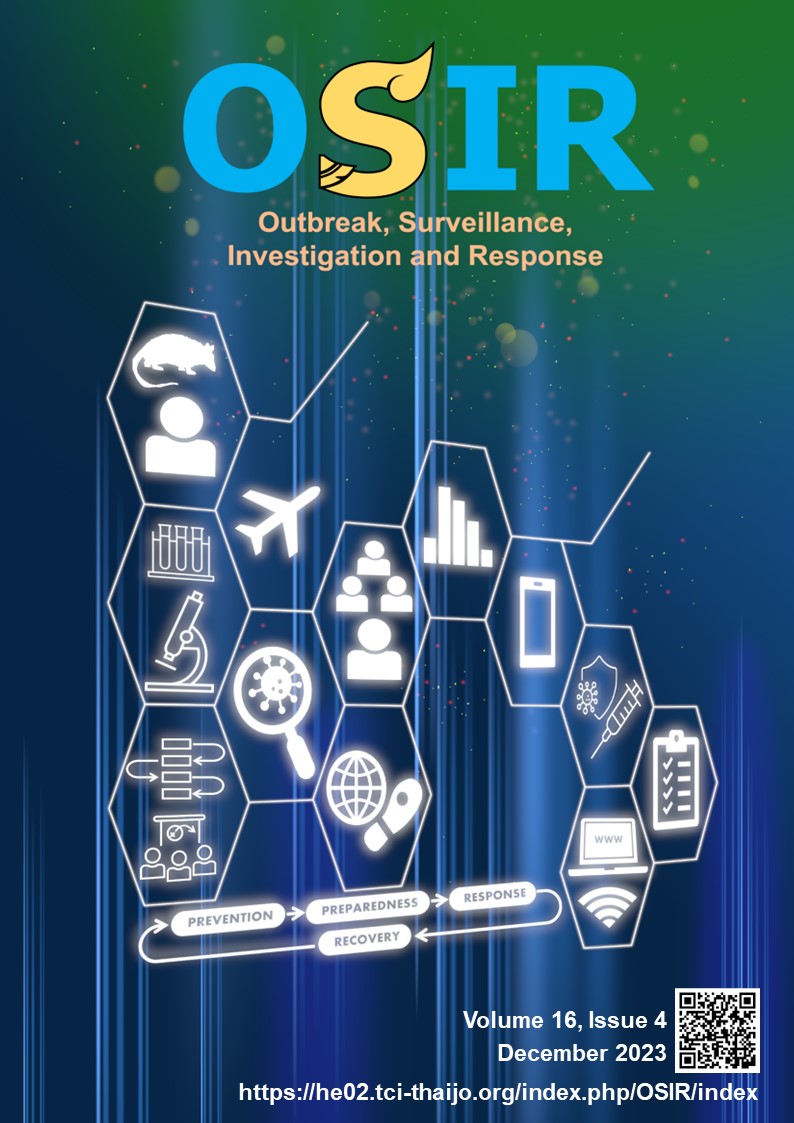An Investigation of a Norovirus Outbreak Linked to Contaminated Vegetables in Mueang District, Chanthaburi Province, Thailand, December 2021–January 2022
DOI:
https://doi.org/10.59096/osir.v16i4.264831Keywords:
norovirus, outbreak, acute diarrhea, foodborne, Chanthaburi, ThailandAbstract
A norovirus outbreak in Mueang District, Chanthaburi Province, was notified on 29 Dec 2021. This study’s objectives were to describe epidemiological characteristics of the outbreak and identify possible sources of the ongoing outbreak. A descriptive study was performed by reviewing diarrhea cases and laboratory results from 1 Dec 2021 to 5 Jan 2022. Interviews were conducted with recent diarrheal cases who had onset during 3 to 5 Jan 2022. Polymerase chain reaction and genetic sequencing were used on patients and environmental specimens to identify genetic linkage. In the retrospective cohort analysis, a medical student cluster was investigated. A total of 675 diarrheal cases were found in Mueang District. Tha Chang Subdistrict had the highest morbidity rate at 0.95%. Out of 77 patient specimens, 30% (23/77) were confirmed norovirus. The median age of cases was 26 years old. Common symptoms included diarrhea (89%), nausea (67%), abdominal pain (67%), and fever (56%). No severe cases were reported. The interviews of recent diarrheal cases revealed that they visited four markets before symptom onset. Seventy percent (21/30) of the markets’ vegetable samples tested positive for norovirus. However, the samples of tap/drinking water, ice, and seafood tested negative. Patient and vegetable genotypes were matched as GII.4[P7]. Contaminated vegetables were suspected sources of the outbreak. The recommendation for early case detection and pre-cool season preventive measures are ensuring adequate residual chlorine level, promoting handwashing, and washing vegetables before consumption.
References
Lucero Y, Matson DO, Ashkenazi S, George S, O’ryan M. Norovirus: facts and reflections from past, present, and future. Viruses. 2021 Nov 30;13(12):2399. doi:10.3390/v13122399.
National Center for Immunization and Respiratory Diseases, Division of Viral Diseases. Virus classification [Internet]. Atlanta: Centers for Disease Control and Prevention (US); 2021 Mar 5 [cited 2022 Oct 11]. <https://www.cdc.gov/norovirus/lab/virus-classification.html>
Khamrin P, Kumthip K, Yodmeeklin A, Jampanil N, Phengma P, Yamsakul P, et al. Changing Predominance of Norovirus Recombinant Strains GII.2[P16] to GII.4[P16] and GII.4[P31] in Thailand, 2017 to 2018. Microbiol Spectr. 2022 Jun 29;10(3):e0044822. doi:10.1128/spectrum.00448-22.
Chuchaona W, Chansaenroj J, Wanlapakorn N, Poovorawan Y. Recombinant GII.Pe-GII.4 Norovirus, Thailand, 2017–2018. Emerg Infect Dis. 2019 Aug;25(8): 1612–4. doi:10.3201/eid2508.190365.
Safadi MA, Riera-Montes M, Bravo L, Tangsathapornpong A, Lagos R, Thisyakorn U, et al. The burden of norovirus disease in children: a multi-country study in Chile, Brazil, Thailand and the Philippines. Int J Infect Dis. 2021;109:77–84. doi:10.1016/j.ijid.2021.06.037.
National Center for Immunization and Respiratory Diseases, Division of Viral Diseases. Common settings of norovirus outbreaks [Internet]. Atlanta: Centers for Disease Control and Prevention (US); 2021 [cited 2022 Oct 11]. <https://www.cdc.gov/norovirus/trends-outbreaks/outbreaks.html>
Jin M, Wu S, Kong X, Xie H, Fu J, He Y, et al. Norovirus outbreak surveillance, China, 2016-2018. Emerg Infect Dis. 2020;26(3):437–45. doi:10.3201/eid2603.191183.
Edlund S, Kaufman J, Lessler J, Douglas J, Bromberg M, Kaufman Z, et al. Comparing three basic models for seasonal influenza. Epidemics. 2011 Sep;3(3–4):135–42. doi:10.1016/j.epidem.2011.04.002.
Eventbased survelliance [Internet]. Nonthaburi: Bureau of Epidemiology, Department of Disease Control, Ministry of Public Health; 2022 [cited 2022 Oct 11]. <https://eventbased-oe.moph.go.th/eventbase/>
Zhou H, Wang S, von Seidlein L, Wang X. The epidemiology of norovirus gastroenteritis in China: disease burden and distribution of genotypes. Front Med. 2020 Feb;14(1):1–7. doi:10.1007/s11684-019-0733-5.
Downloads
Published
How to Cite
Issue
Section
License
Copyright (c) 2023 Outbreak, Surveillance, Investigation & Response (OSIR) Journal

This work is licensed under a Creative Commons Attribution-NonCommercial-NoDerivatives 4.0 International License.









